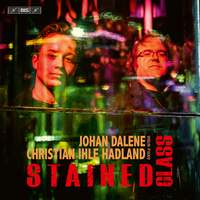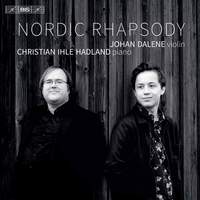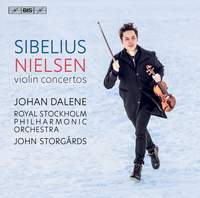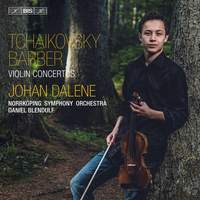Interview,
Johan Dalene on Stained Glass
His second album saw him collaborating with Norwegian pianist Christian Ihle Hadland in a recital of music by their compatriots, and earlier this month the pair teamed up once again for Stained Glass – featuring works by Bacewicz, Ravel, Prokofiev, Pärt and Lili Boulanger.
Before heading off to revisit the Nielsen concerto with Edward Gardner and the London Philharmonic Orchestra last month, Johan spoke to me about the infinite variety of Bacewicz’s music, the magic which he finds in Pärt’s particular blend of mathematical and meditative elements, the singular challenges of embarking on a freelance career in late 2019 - and how disturbing his cellist father’s practice-sessions as a four-year-old led to them striking a fruitful musical bargain…
The four pieces by Grażyna Bacewicz were such lovely discoveries for me: when did they come onto your radar?
I first started playing her music in about 2019; I was looking for something fairly short to programme alongside the Franck sonata, and I wanted to find something that people weren’t playing all the time. I stumbled on these pieces in an anthology on my bookshelf and thought they were great: it’s also good music to couple with Prokofiev, so it seemed like a great choice for the album!
I think her music’s been getting more and more popular over the last few years; the chamber works in particular are being played quite regularly now. She wrote so much for the violin - I haven’t listened to everything, but I thought it might be nice to select a range of pieces from various periods in her life because she developed so much as a composer. It’s not that the later pieces are ‘better’ than the earlier ones, but if you listen to something like Witraz (‘Stained Glass’) from 1932 alongside the Humoresque from twenty years later you’ll immediately hear that it’s a very different style of writing.
Bacewicz was a violinist herself - you can really hear that she knew the instrument well and was aware of all its possibilities. There were definitely some technical challenges along the way, as she’s quite fond of using a lot of fifths and fourths (especially in the Humoresque): it’s a bit different from what I’m used to playing, but I think it’s great! There are so many more pieces of hers that I want to explore…
This is your second recording with Christian Ihle Hadland: how did your friendship come about?
I’ve lived in Sweden my entire life, but I’m half-Norwegian and have relatives very close to Stavanger in Norway, which is where Christian is from – he runs a chamber music festival there, and that’s where we met a few years ago. I’d been a big fan of his for years, and when we got to play together for the first time in 2019 or 2020 it felt so natural and easy: I think he’s a terrific musician and a great guy, so I asked him if he’d be interested in making it a longer-term thing!
The first recording that we did was actually one of our first projects together – we were supposed to play a couple of concerts for Christian’s festival in 2020, but then COVID happened…Sweden became a bit infamous for the way we dealt with the pandemic, but from a selfish point of view it was quite nice. There were still concerts happening for almost the whole period, right from April 2020. Some of those early ones took place without a live audience, which felt more like doing a radio broadcast than a concert as such: it’s not as relaxed, strange though that might sound. I also find it much easier to practice and work and you have concrete goals – if there’s nothing in the diary for a year, motivation can become an issue…
You came to international attention when you won the Carl Nielsen Competition in 2019, but of course 2020 ended up being a very challenging year for everybody…how much did your career-plans change as a result of the pandemic?
The competition was in the spring of 2019 and I finished gymnasium (the Swedish equivalent of high school) in the summer. I thought about taking the usual route and applying to conservatoires, but I decided I wanted to see how it would feel to freelance at least for a year first…then COVID came along and I sort of regretted not going to school! But once travel restrictions started to ease up I felt like it had still been the right choice.
Throughout that whole period I continued to study with Per Enoksson [the leader of the Gothenburg Symphony Orchestra] who’s been my main teacher since I was 11, and I was incredibly lucky to be able to get some lessons from Janine Jansen: she was at home in Sweden for the entire lockdown, and she’s one of my biggest idols.
Returning to the album, what was the thinking behind coupling the Prokofiev and Ravel sonatas?
It’s not a terribly philosophical reason, but in all honesty I picked them because I’ve played them a lot! The Prokofiev and Ravel sonatas are among the pieces I’ve performed the most in my life, and Christian and I have done them together quite often. They’re quite close in time and they both have the jazzy elements and neo-Classical stuff going on, but they’re also very different.
You sound incredibly at home with the blues movement of the Ravel – is that familiar musical territory for you?
Thanks, because the truth is that I’ve never played jazz or blues in my life! I really love listening to that stuff, but it’s not something that I’ve ever done. It’s a lot of fun to play, that middle movement: the interesting and tricky thing is that it really needs to sound spontaneous, like the music’s just happening in the moment. Christian and I have played it quite a few times together now, and it seems to get freer and freer every time we do it.
And how about the specific technical and musical challenges of the Prokofiev sonata?
It’s nowhere near as difficult as something like the Nielsen concerto (which is uppermost in my mind right now because I’m playing it tomorrow!), but it has its moments. It’s a little like the Bacewicz pieces in that it isn’t super-technical and demanding, but it’s a very distinct and special approach to writing for the violin and you have to get used to that. It’s very challenging to get the right mood, especially for the first movement…
Arvo Pärt’s Fratres has achieved enormous popularity since its premiere in 1980 (not least because of its frequent use in TV and film): what do you think makes the piece so special?
I personally think it’s an amazing piece, and it’s been a companion of mine for quite a long time. It’s very mathematical in a way - it’s all written around the same fifth, which is developed in phrases of 7, 9 then 11 bars etc….But you don’t think about the underlying maths when you hear it – it just fits together super-well, and it’s kind of nice the way it fades in and gets very intense in the middle then fades back out again. Every variation is quite distinct and has something special to say.
One of my favourite recordings is by Gidon Kremer, who is another idol of mine – the piece was actually written for him, so it’s very special. A few years ago I was part of a Norwegian programme for young musicians called Crescendo, where he and Janine Jansen were two of the mentors: me and a couple of other participants got to meet and play for him, and it was very inspiring.
Chamber music is a great passion of yours, and was an integral part of your residency with the Swedish Radio Symphony Orchestra a few years ago – how much opportunity to you get to play it these days?
I couldn’t live without chamber music. Because I’m focusing on the solo repertoire at the moment, I don’t have any fixed group that I play with regularly - I would love to play in a string quartet one day, but right now it just isn’t possible. That’s why I’m so grateful for summer festivals, which are a great opportunity to explore repertoire with friends old and new. One of my best friends from Sweden is a cellist, and we try to meet up each summer: we’ve been playing together since we were eight!
And I gather you had dreams of becoming a cellist yourself when you were very young…
Yes! I wanted to be a cellist because my dad was a cellist: he’d practice at home and I’d listen and disturb him! My parents realised I wanted to play an instrument, and they thought it would be nice if I at least tried something different from them; the main violin teacher in my hometown of Norrköping had a fantastic reputation, so my dad said ‘Give the violin a year, and if you want to switch after that, then fair enough’. But as it turned out I didn’t!
Johan Dalene (violin), Christian Ihle Hadland (piano)
Available Formats: SACD, MP3, FLAC, Hi-Res FLAC
Johan Dalene (violin), Christian Ihle Hadland (piano)
Available Formats: SACD, MP3, FLAC, Hi-Res FLAC
Johan Dalene (violin), Royal Stockholm Philharmonic Orchestra, John Storgårds
Available Formats: SACD, MP3, FLAC, Hi-Res FLAC
Johan Dalene (violin), Norrköping Symphony Orchestra, Daniel Blendulf
Available Formats: SACD, MP3, FLAC, Hi-Res FLAC







